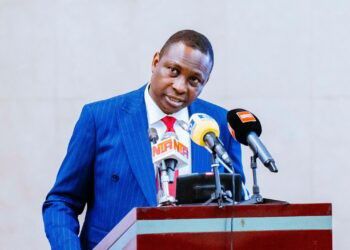'We're not your enemies' - EFCC boss begs South-East youths for cooperation

```html EFCC Boss Appeals to South-East Youths for Collaboration in Anti-Corruption Fight The Chairman of the Economic and Financial Crimes Commission (EFCC), Ola Olukoyede, has called on young people in the South-East region of Nigeria to actively support the agency's efforts to combat corruption and financial crimes. He made this plea during the 2025 Police Community Relations Committee (PCRC) Conference held in Enugu State on Thursday, June 26, 2025.
Olukoyede emphasized the crucial role of youth involvement in the fight against corruption, stating that the future success of the anti-graft campaign hinges on their participation. He urged them to see the EFCC as an ally, not an adversary.
“We are resilient and always insist that the right thing is done against all odds. Please, cooperate with us. We are not your enemies, we are your friends. We are here to protect you and to serve you,” Olukoyede stated.
EFCC's Renewed Focus on the South-East The EFCC chairman, represented by the agency’s Acting Enugu Zonal Director, Aisha Abubakar, articulated the commission's commitment to sanitizing the South-East region from economic and financial crimes. This renewed focus aims to create an environment where young people can thrive and contribute positively to society.
“The EFCC is here to enable the youths and help them re-align with their future endeavors because, without them, our tomorrow is not assured," Abubakar stated, relaying Olukoyede's message. "We need the youths to hand over to, but they must have integrity, be knowledgeable, and willing to impact the community. We are determined to turn the fortunes of the Southeast completely around, in relation to the fight against economic and financial crimes.”
Olukoyede specifically requested assistance from the youth in the area of intelligence sharing, emphasizing its importance in effectively combating financial crimes. He also encouraged them to utilize the EFCC's "Eagle Eye App" to report any suspicious or fraudulent activities.
Expert Perspective: The Importance of Youth Engagement Dr. Chidi Nnoli, a Professor of Criminology at the University of Nigeria, Nsukka, emphasizes the significance of engaging youth in anti-corruption efforts. “Young people are often the most vulnerable to the allure of quick money and illicit activities, particularly in regions facing economic hardship,” Dr. Nnoli explains. “By actively involving them in the fight against corruption, we empower them to become agents of change within their communities. This includes providing them with education, opportunities, and a platform to report suspicious activities without fear of reprisal."
Historical Context and Current Challenges Corruption has long been a persistent challenge in Nigeria, hindering economic development and eroding public trust. Previous administrations have launched various anti-corruption initiatives, with varying degrees of success. The EFCC, established in 2003, has played a central role in investigating and prosecuting cases of financial crimes. However, challenges remain, including political interference, inadequate resources, and a complex legal system that often delays justice.
The South-East region, in particular, has faced unique socio-economic challenges that can contribute to an environment conducive to corruption. These include high unemployment rates, limited access to opportunities, and a sense of marginalization among some segments of the population. Addressing these underlying issues is crucial for achieving long-term success in the fight against corruption.
Moving Forward: Building a Culture of Integrity The EFCC's call for collaboration with South-East youths represents a strategic effort to build a culture of integrity and accountability. By empowering young people to become active participants in the fight against corruption, the agency aims to create a more transparent and equitable society. This requires a multi-faceted approach that includes:
Strengthening educational programs on ethics and civic responsibility. Providing economic opportunities for young people to reduce their vulnerability to corruption. Ensuring the protection of whistleblowers who report corrupt practices. Promoting transparency and accountability in government institutions.
The success of the EFCC's efforts will depend on the willingness of South-East youths to embrace their role as agents of change and work collaboratively with the agency to build a better future for their region and the nation as a whole. ```
Originally sourced from: pulse Ng
